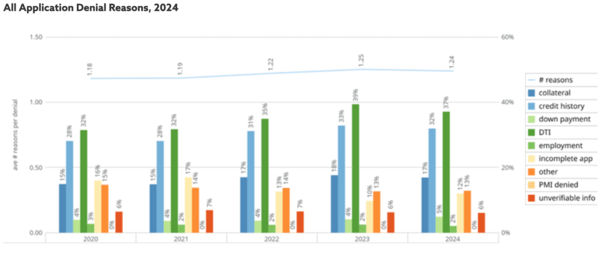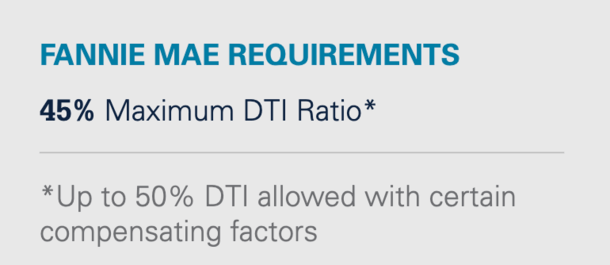
Final yr marked yet one more yr the place excessive debt-to-income earnings ratios have been the main reason behind denial for mortgage candidates.
Whereas a low credit score rating can be a major issue, typically it would simply result in a better mortgage price.
Meaning you’ll be able to nonetheless get authorised for a house mortgage with marginal credit score, but it surely’ll be dearer.
In different phrases, you need to concentrate on maintaining your different liabilities as little as doable when making use of for a mortgage.
Apparently, this could truly assist your credit score rating within the course of as nicely!
Excessive DTIs Prime Motive Mortgages Are Declined

In 2024, the highest cause mortgages have been declined was as a consequence of an elevated debt-to-income ratio (DTI).
This was the case throughout all varieties of purposes, based on a brand new examine from iEmergent.
And it has been a steady development, “rising steadily from 32% in 2020 to 39% in 2023,” although there was a slight drop to 37% in 2024.
This didn’t come as a lot of a shock given the rise in each house costs and mortgage rates in recent times, to not point out rising property taxes and owners insurance coverage prices.
Lengthy story quick, the upper the mortgage cost, the upper your DTI ratio, all else equal.
The second main reason behind denial was credit score scores, aka low ones.
Lenders have minimum credit score thresholds, however they’re typically fairly liberal.
Because of this, you will get authorised for a mortgage with the rating as little as 620 for Fannie Mae and Freddie Mac.
And even get authorised with a rating under 600 for different varieties of loans equivalent to an FHA loan.
On the subject of DTIs, the rules are a little bit extra grey and versatile.
As a substitute of a tough reduce off, you would possibly see a spread that elements in earnings, property, down cost, and so forth.
It’s extra of a holistic view of complete danger, which can enable DTIs to go increased when you have compensating elements.

For instance, Fannie Mae usually allows DTIs as excessive as 45%, however as much as 50% when you have plenty of liquid reserves, or a powerful credit score historical past.
A great way to have a look at that is which you can get away with a low credit score rating, however you could be locked out fully in case you’re DTI is simply too excessive.
DTIs and Credit score Scores Are Inside Your Management
Whereas some would possibly throw their fingers up and say it’s not truthful, or that these items are exterior their management, it’s merely not true.
Each of those variables are inside your management. Whether or not it’s paying payments on time or limiting your excellent credit score balances.
What’s additionally fascinating is DTIs and credit score scores go hand-in-hand as nicely.
Somebody with extra excellent revolving debt will seemingly have a decrease credit score rating, all else equal.
However you’re extra prone to get denied outright when you have a excessive DTI than you’re a low credit score rating.
What this implies is it is best to pay shut consideration to your month-to-month liabilities when figuring out how a lot you’ll be able to afford.
Two debtors with the identical quantity of earnings aren’t essentially created equal if they’ve completely different quantities of excellent debt.
For instance, a borrower with a $600 automotive lease cost versus a borrower with a paid off car.
In case you have $600 much less monthly obtainable for a mortgage, it’s going to result in a better DTI ratio.
As famous, this will even have the unintended consequence of decreasing your credit score rating as nicely.
In a nutshell, the credit score bureaus will view you as extra dangerous when you have extra excellent revolving debt (or installment debt for that matter).
A best-case state of affairs for a mortgage applicant can be having little to no revolving debt.
This could imply all or most of their month-to-month earnings may go in direction of the house mortgage obligation as a substitute.
And this may result in a decrease DTI ratio, which might enhance their approval odds.
The great thing about that is these items are intertwined so in case you do nicely to restrict debt, you may as well get pleasure from a better credit score rating.
So in case you’re a perspective house purchaser, or somebody trying to refinance an existing mortgage, paying shut consideration to your DTI may help your credit score rating as nicely.
Two Borrower’s Incomes May Not Be Created Equal
This additionally explains why it’s tough to offer a common reply when individuals ask how much house can I afford?
As famous, two individuals on the identical precise earnings stage will be capable of afford completely different mortgage quantities based mostly on their different, non-housing associated debt.
Your DTI ratio is definitely two numbers, a front-end ratio to your proposed housing cost, and a back-end ratio that features all month-to-month money owed.
For those who’re in a position to maintain all the opposite stuff low, whether or not it’s an auto mortgage or bank card debt, you’ll have extra earnings obtainable to your mortgage.
Bringing all of it collectively, much less debt usually leads to a better credit score rating, which in flip leads to a decrease rate of interest in your mortgage.
And by definition, that provides you a decrease housing cost, which might additional decrease your DTI. You see the way it’s all related?
So the 2 greatest issues to concentrate to if you want to qualify a mortgage are your DTI and your credit score rating. However your DTI can dictate your credit score scores, which means placing much more emphasis on that.
Other than saving for a down cost, you also needs to pay down every other excellent debt to extend your own home buying energy (if mandatory).
Doing so ought to enhance your odds of getting authorised for a house mortgage.
Whereas there are many other reasons you can get declined for a mortgage, these are the main causes and they need to be your focus.
Conserving an in depth eye on these points will ideally show you how to keep away from any undesirable surprises when you do apply.
(photograph: Joel Kramer)